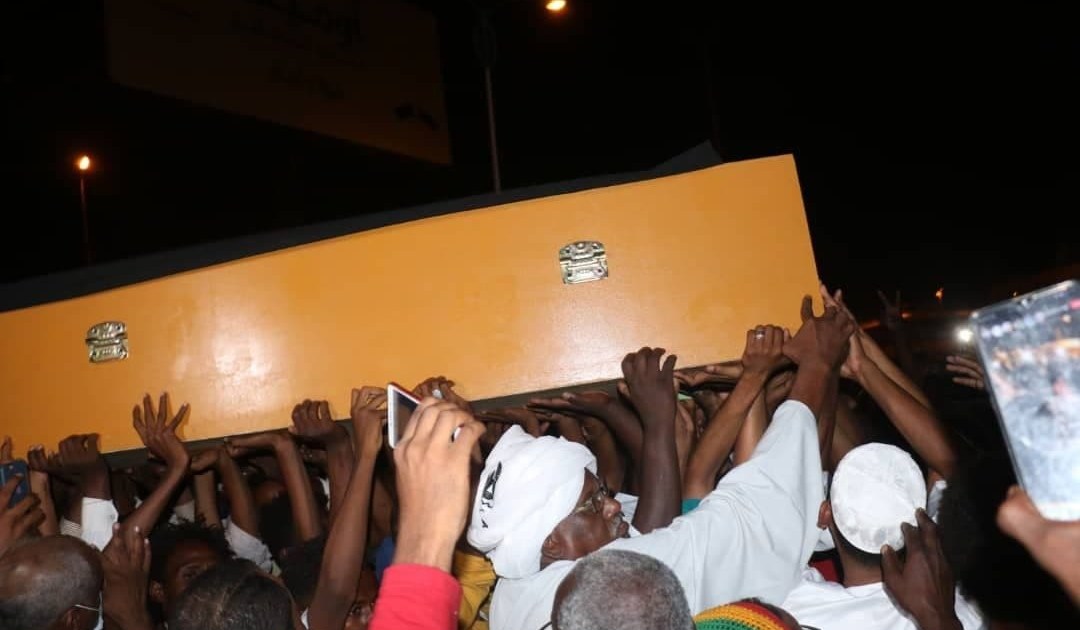Khartoum – The accounts of those killed in the protests in Sudan on social media platforms have become a destination for their comrades seeking to revive their biography, inspiring their comments and tweets, especially those they wrote on those platforms shortly before their death.
And phrases such as “We are tired, my friend, but no one can lie down during the battle,” written by Abdel Azim Babiker, who was killed waving the fingers of victory in front of a column of soldiers, at the beginning of the revolution against the ousted President Omar al-Bashir, became a slogan for the protesters, instilling enthusiasm in their hearts.
A trip worth a lifetime
Activists pay remarkable attention to the posts of the dead on social media platforms, and they are widely spread.
Before he was killed by a bullet in the abdomen, which he received during his participation in the processions of January 13, in the city of Bahri, Al-Rih Muhammad (21 years) wrote a post on his Facebook account, accompanied by a picture of a protester written on his shirt, “Our martyrs have not died,” in which he affirmed the inevitability of the revolution’s victory. Sudanese, although the price of this trip is old.
One of Muhammad’s friends, who asked not to be named, says, “The coup authorities are selecting the best of us, in order to kill the spirit of the revolution in us, but no way,” considering the departure of the wind Muhammad a great catastrophe, and that he left a void that cannot be easily filled.
He added to Al-Jazeera Net, “Muhammad was always in the front lines, you find him in the front line in the demonstrations, as you find him at the front of the line when it comes to volunteer work.”
for freedom
Another bullet in the abdomen took Abdullah Abbas (Russian) two days after he was wounded in the protests on December 30 last year, and he died early this year from his injury.
Abdullah Abbas, who took his surname (Russian) from his Russian mother, appeared moments before his death in a picture leading the ranks of the protesters, and before his death he wrote on his account a statement confirming their right to freedom as an inherent right to life.
The Russian comrades circulated this argument to demand to move forward on the path of freedom, and to restore the democratic path in their country.
Ahmed Noureddine, who lives in the suburb of (Al-Fetihab) in Omdurman, near the house of his Russian friend, stresses that the 23-year-old was one of the most prominent activists of the protest movement.
He tells Al Jazeera Net that the Russian was characterized by great courage, and did not retreat from his dream of a democratic civil state, despite being targeted and injured several times, as he had previously been arrested during the era of ousted President Omar al-Bashir.
Noureddine reveals that the Russian received a bullet in the stomach on December 30, while one of his closest comrades who was next to him escaped sniping with a bullet that hit him in the head with superficial scratches.
He added that the Russian continued to suffer and bleed for hours as a result of his injury inside the home of the Omdurmaniya family, which took him and his companion, after they were evacuated from the street, as a result of the difficulty of moving at that time due to the heavy security deployment.
catch up with his friend
At the beginning of this year, hours after the killing of the Russian, his friend Hossam El-Din Adam (24 years) replaced his profile picture with the image of his late friend, and attached it to phrases showing the extent of the loss, saying, “Yesterday I was in … yesterday I was alive and breathing.”
Only a day later, Hossam El-Din came out of his friend’s pavilion, to participate in the protests of January 2, but at the end of the day he returned carrying a coffin, after receiving a bullet in the chest, to catch up with his friend, and it was clear that he could not live without him.
https://www.facebook.com/photo/?fbid=2040320519483668&set=a.147572175425188
looking for love
18-year-old Mustafa Khader was wounded by a bullet while participating in the processions of October 21, 4 days before Al-Burhan’s procedures, to demand the civilian authority, and to reject any calls by the military component to expand the base of participation in the government.
The economics student at Al-Zaeem Al-Azhari University died in hospital as a result of complications from the injury, and after 3 days of the proof procedures, which made the statistics authorities count him among the lists of protesters against the military rule.
Lakhdar’s leaflet was published, in which he was fascinated by the state of love in which the protesters immerse their dead, until he asked: If I became a martyr, would you love me?
In response to this question, we find Mustafa Khader’s name in the first list of protest deaths issued by the Ministry of Health in Khartoum State recently.
insistence
One of the youngest dead in the protests is “Bibo” or Muhammad Al-Mustafa Majid Zarrouk (18 years), who was preparing to enter the design department at the Faculty of Fine Arts of the Sudan University of Science and Technology, but he was shot in the head, while participating in the protests last December 30 in Um Dorman.
The young man was known for many talents, as he is a musician, and a lover of photography. And from his last conversations on the instant messaging application (WhatsApp) with one of his friends, he commented on the possibility of Prime Minister Abdullah Hamdok stepping down from his position that he is not concerned with this matter, and he will continue to escalate, even if the opposite is his death.
Hamdok resigned from his position on January 2, after he failed to bring the Sudanese parties closer together, and popular protests continued in the streets against the army’s seizure of power, and against his agreement with the head of the Sovereign Council, Lieutenant-General Abdel Fattah al-Burhan.
inspirational models
The journalist and political analyst, Jamil Al-Fadil, told Al Jazeera Net, “The sayings and phrases written by the revolution’s dead are inspiring to the living, and therefore they are fuel and increase for those behind them to move on their way with greater impetus,” adding, “Dealing with the wills of the dead usually accompanies strictness, so let alone what If this dead man was killed for a cause.”
Regarding the cases of some of the protest dead joining their comrades after an obituary was published on the communication platforms, Al-Fadil explains that this is the result of a feeling of responsibility and honesty that leads to great valor and sacrifice.





